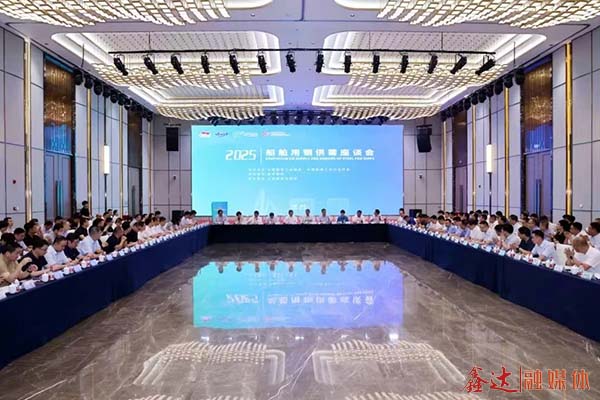On June 26th, the 2025 Symposium on Supply and Demand of Ship Steel was held in Nanjing, Jiangsu Province. This meeting is the fifth supply and demand symposium jointly held by the steel and shipbuilding industries. The meeting has further consolidated the consensus on collaborative cooperation between the two industries and promoting the stable operation of the industrial chain, providing a direction for the two industries to break through in the current complex international situation.

Luo Tiejun, vice president of the China Iron and Steel Association (hereinafter referred to as "CISA"), Li Yanqing, secretary-general of the China Association of the National Shipbuilding Industry (hereinafter referred to as "CISA"), and Wang Ke, Director of the Steel Division of the Raw Materials Department of the Ministry of Industry and Information Technology, delivered speeches. Gao Xiang, director of the Materials Industry Division of the Nanjing Municipal Bureau of Industry and Information Technology, extended a welcome. Zhang Ming, deputy general manager of the Shanghai Futures Exchange (hereinafter referred to as "SHFE"), also addressed the audience. Zhu Ruirong, president of Nanjing Iron & Steel Co., LTD., Ren Zhuqian, vice president of Shanghai Steel United, and others attended the meeting. Shi Hongwei, deputy secretary-general of the China Iron and Steel Association, and Tan Naifen, deputy secretary-general of the China Shipbuilding Association, respectively presided over each session of the meeting.
Luo Tiejun said that in recent years, the steel and shipbuilding industries have actively strengthened communication and coordination, established close upstream and downstream cooperative relationships, jointly withstood the adverse effects brought by fluctuations in the industrial chain, achieved good cooperation results, and become a model of industrial chain collaboration. Under the current circumstances, the deep integration of the two major industries is not only an inevitable choice to enhance industrial competitiveness, but also a strategic cornerstone for jointly building a safe and stable industrial chain and supply chain, effectively resisting external risks, and jointly maintaining the global market. (Detailed reports will be sent separately.
Li Yanqing proposed that since the "14th Five-Year Plan", the global shipbuilding industry has ushered in a new round of upward cycle. With the support of the steel industry, the shipbuilding industry has achieved effective quality improvement and significant growth in quantity. China has grown into a leader in the global shipbuilding industry. Facing the changes in the global shipbuilding industry, the shipbuilding and steel sectors need to embrace the transformation with closer collaboration and more fearless innovation. On the one hand, they should continue to focus on a stable collaboration mechanism; on the other hand, they should carry out collaborative technological breakthroughs and jointly address challenges.
Wang Ke stated that the steel and shipbuilding industries are important pillar industries of the national economy and key forces in building a manufacturing power and a maritime power. Facing the current complex and volatile global market, the pressure of green and low-carbon transformation, and fierce international competition, the steel and shipbuilding industries should continue to expand the breadth and depth of cooperation, jointly promote the improvement of green and digital development levels, improve and perfect the long-term cooperation mechanism and risk-sharing mechanism, enhance the stability and risk-resistance capacity of the industrial chain and supply chain, and achieve win-win cooperation. Promote the high-quality development of the two major industries.
Gao Xiang stated that the rapid development of the shipbuilding industry has driven continuous innovation and progress in the steel industry, and the high-end supply of the steel industry has also supported the high-quality development of the shipbuilding industry. At present, the iteration of innovative technologies and the impact of the external environment are reshaping the regional economic landscape, industrial ecosystem and competitive pattern. The security and stability of the industrial chain and supply chain have gradually become the lifeblood of industrial development and the survival of enterprises. The steel and shipbuilding industries are upstream and downstream industries with closely connected industrial chains and supply chains, and they are also strategic alliances that promote each other. There is still room for improvement in their coordinated development.
Zhang Ming said that currently, geopolitical conflicts and international trade frictions occur frequently, and the steel and shipbuilding industries are under pressure from various aspects such as the market, the environment and transformation. To this end, the Shanghai Futures Exchange will optimize its operation mechanism to promote the functioning of futures. Deepen industrial services and facilitate the participation of physical enterprises; Adhere to strong supervision and risk prevention to better promote the development of the futures market; Comprehensively deepen the special action for the high-quality development of steel futures to facilitate the stable operation of China's steel industry.
At the meeting, several shipbuilding enterprises including China State Shipbuilding Corporation Materials Co., LTD., COSCO Shipping Heavy Industry Co., LTD., China Merchants Industrial Group Co., LTD., and Jiangsu Yangzijiang Shipbuilding Group Co., Ltd. signed long-term procurement agreements with several steel enterprises such as Ansteel Co., LTD., Shougang Co., LTD., Hebei Iron & Steel Co., LTD., Jiangsu Shagang Group Co., LTD., Shandong Iron & Steel Co., LTD., Nanjing Iron & Steel Co., LTD., Jingye Group, and Longteng Special Steel.
Subsequently, representatives from shipbuilding and steel enterprises held a symposium and exchange, delving deeply into topics such as strengthening win-win cooperation in the industrial chains of the two industries, enhancing supply guarantee capabilities and product quality, innovating collaborative cooperation models, and optimizing the logistics and distribution system.
At the afternoon meeting, Cao Bo, deputy director of the Statistics and Information Department of the China Shipbuilding Industry Association, delivered a keynote speech titled "The Operation Status and Outlook of China's Shipbuilding Industry", and Tang Hongxue, deputy director of the Market Research Department of the China Iron and Steel Association, also presented a keynote speech on "The Operation Status and Outlook of China's Steel Industry". Subsequently, He Minghui, assistant general manager of Jiangsu Yangzijiang Shipbuilding Group, Chen Linheng, director of Nanjing Iron and Steel New Materials Research Institute, Xu Tao, deputy director of the Commodity Department One of Shanghai Futures Exchange, Qin Weimin, general manager of Nantong Xiangyu Marine Equipment Co., LTD., and Wang Jingjing, assistant general manager of the Plate and Strip Division of Shanghai Steel United Speeches were delivered respectively on themes such as changes in the demand for Marine plates, the application of derivative tools in the shipbuilding industry, the role of futures in promoting high-quality development of the steel industry, and the operation of the medium and heavy plate industry.

 Email
Email Email
Email
